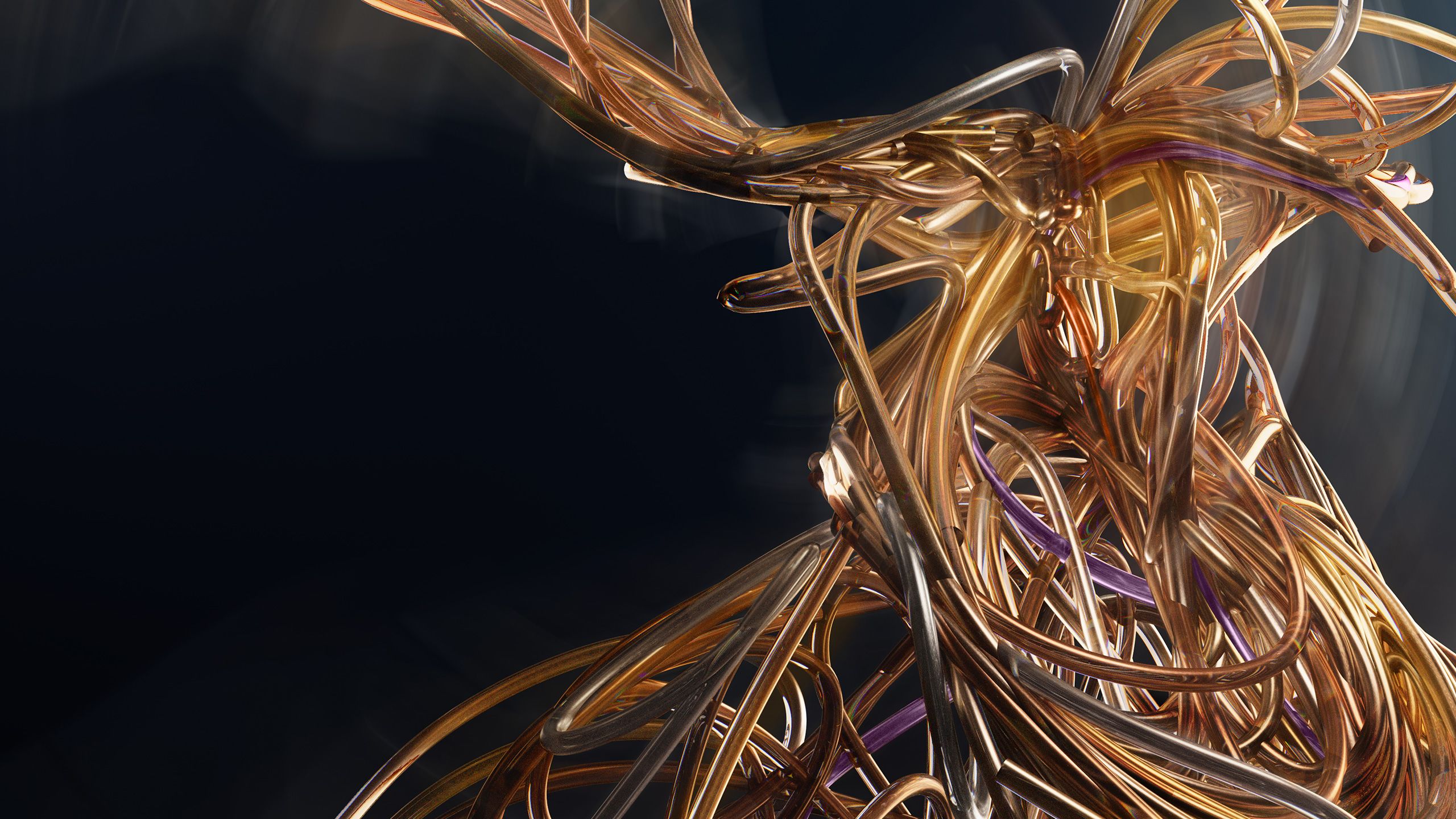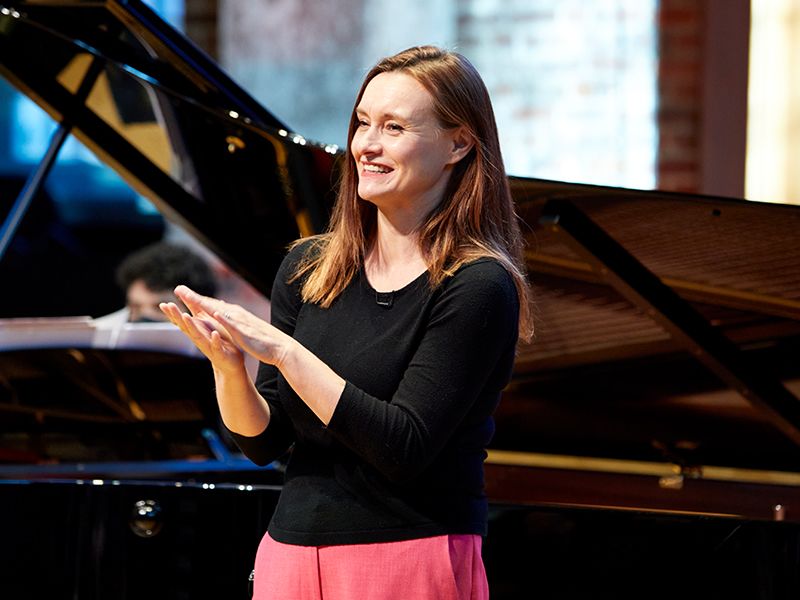LSO Discovery
Free Friday Lunchtime Concert

TODAY'S CONCERT
Ethel Smyth Scherzo from String Quintet in E major
Luciano Berio Aldo from Duets for Two violins
Antonín Dvořák Scherzo from Terzetto in C major Op 74
Friedrich Dotzauer Larghetto from Six Pieces for Three Cellos (arranged for two violas and cello)
Dave Anderson Kibbles & Kibbitz and Laments (for bass duet)
Luigi Boccherini Excerpts from 'Musica notturna delle strade di Madrid’
LSO String Experience Members
Isobel Howard violin
Shoshanah Sievers violin
Lukas Bowen viola
Teresa Macedo Ferreira viola
Danushka Edirisinghe cello
William Puhr double bass
James Trowbridge double bass
Rachel Leach presenter
Eve-Marie Caravassilis concert curator & coach
Tom Goodman concert curator & coach
USING YOUR DIGITAL PROGRAMME
- Connect to the free hawksmoor WiFi network.
- Navigate using the menu icon (≡) at the top of the screen.
- Please set your phone to silent and don't use other apps during the music.
The LSO String Experience Scheme is kindly supported by the Thriplow Charitable Trust.
Ethel Smyth (1858 to 1944)
String Quintet in E major
✒️ 1884 | ⏰13 minutes

3 Scherzo
Ethel Smyth was born in Sidcup. Her father was a major general in the Royal Artillery and was against her taking up a position at the Leipzig Conservatoire. So, the teenage Ethel shut herself in her bedroom and refused meals until he agreed – little did he know then that she was to encourage others to employ similar tactics years later in the fight for women’s votes! In Germany, Smyth met and befriended many of the great composers of the Romantic period including Clara Schumann, Johannes Brahms and Pyotr Ilyich Tchaikovsky. This string quintet is listed as Ethel’s Opus 1, but it was actually the first piece she allowed to be published, rather than the first thing she wrote. The Scherzo is vibrant and jolly with a contrasting middle Trio section that is a bit like a pause for thought.
Note by Rachel Leach
Luciano Berio (1925 to 2003)
Duets for Two Violins
✒️ 1983 | ⏰2 minutes

No 24 Aldo
Luciano Berio was an extremely important and influential Italian composer. His music often deconstructs text, quotes other famous pieces, features extended playing techniques and is best described as post-modernist. Throughout his long career, Berio always had an eye on the past; he transcribed many famous works from Luigi Boccherini to Johannes Brahms and ‘completed’ Giacomo Puccini's Turandot and Robert Schubert's Symphony No 10.
In 1979, a violin teacher casually mentioned to Berio the lack of good violin duets to play with his students and so the composer set about correcting this. Over the next four years, working overnight or in downtimes while on tour, he completed 34. Each one is dedicated to a musical friend and contains a technical challenge for the student and an ‘easier’ part for teacher, much like the famous duets by Béla Bartók. Aldo is for Aldo Bennici, a famous Italian viola player. It is a reworking of Berio’s favourite folksong ‘E si fussi pisci’ which translates as ‘If I were a fish’.
Note by Rachel Leach
Antonín Dvořák (1841 to 1904)
Terzetto in C major
✒️ 1887 | ⏰5 minutes

3 Scherzo: Vivace — Trio: Poco meno mosso
Antonín Dvořák was born and spent most of his life near Prague. He had a good musical education from the age of six and grew up to be a fine viola player and teacher. He found it hard, however, to make a living from his true love – composing. Throughout the 1860s and early 1870s, he wrote a lot of music in varying styles for submission to competitions in the hope of winning money and getting good notices. Much of this music was lost or never performed. Throughout this time, Dvořák played viola in the Bohemian Provisional Theatre Orchestra and taught piano to make ends meet. This Terzetto (trio) from 1887 is for the unusual combination of two violins and viola. It features some lively cross-rhythms and has a folksy sound. The contrasting Trio section is much smoother, quieter and calmer.
Note by Rachel Leach
Friedrich Dotzauer (1783 to 1860)
Six Pieces for Three Cellos (arranged for two violas and cello)
✒️ 1835 | ⏰5 minutes

6 Larghetto; Allegro
Friedrich Dotzauer is perhaps not a name many of us will immediately be familiar with, but his life spanned one of the most fruitful periods in German music. He was born during Wolfgang Amadeus Mozart’s heyday, lived throughout Ludwig van Beethoven’s life, and finished his career playing principal cello under the baton of Richard Wagner. Dotzauer’s father, a pastor, encouraged his son as he learnt piano, violin, horn, and clarinet before settling on the cello. He was then a member of several orchestras, gradually rising up the ranks to principal in Dresden. As a composer, his output is mostly for cello and his studies and exercises are still used by student cellists around the world. This Larghetto was written for three cellos but will be played today by two violas and cello. It features a steady pizzicato (plucked) ‘walking’ bassline, alongside a smoother wandering melody.
Note by Rachel Leach
Dave Anderson (b 1949)
Seven Double Bass Duets
✒️ 1996 | ⏰4 minutes

No 1 Kibbles & Kibbitz
No 5 Lament
Dave Anderson is an American bassist and composer. His father was principal bass trombone with the Cleveland Orchestra and, almost following in his footsteps, Anderson has been principal bass with Louisiana Philharmonic since 1996. Much like Luciano Berio, and in the mould of Béla Bartók, Anderson wrote these duets when he found a shortage of pieces to play. He says they are written with humour because it’s funny to think of the double bass as a solo instrument. Kibbles & Kibbitz is inspired by a conversation between dogs, and Lament, the only serious piece from the set, is a simple melody dedicated to his first teacher, Tony Knight.
Note by Rachel Leach
Luigi Boccherini (1743 to 1805)
Musica notturna delle strade di Madrid
✒️ 1780 | ⏰6 minutes

3 Minuetto dei Ciechi
5 Passa Calle
7 Ritirata
This string quintet is often known as Musica notturna delle strade de Madrid (Night Music from the Streets of Madrid), and it is there that Italian composer and cellist Luigi Boccherini found himself in 1780 working for the exiled Spanish king. Scholars argue over whether the work is programmatic (meaning it tells a story), but every movement has an evocative title. Boccherini himself refused to publish the work outside of Spain claiming it would be ‘ridiculous’ to people unfamiliar with the location. Today we will hear three movements: 'Minuetto dei Ciechi', where Boccherini asks the cellist to turn their instrument sideways and play like a guitar. 'Passa Calle', which describes singers and revellers ‘passing along’ the street. And finally 'Ritirata', which is about the retreat of the night watch, announcing curfew and shutting down the streets for the night.
Note by Rachel Leach
About the Artists

Rachel Leach
presenter
Rachel Leach was born in Sheffield. She studied composition, and her music has been recorded by NMC and published by Faber. She has won several awards including, with ETO, the RPS award for best education project 2009 for One Day, Two Dawns.
Rachel has worked within the education departments of most of the UK’s orchestras and opera companies. The majority of her work is for the London Symphony Orchestra and the London Philharmonic Orchestra. Rachel has written well over 20 pieces for LSO Discovery and 15 community operas, including seven for ETO.
Increasingly in demand as a concert presenter, as well as presenting the LSO Discovery Free Friday Lunchtime Concert series, she regularly presents children’s concerts and pre-concert events for the LSO, LPO, Philharmonia Orchestra, Scottish Chamber Orchestra, Royal College of Music and Royal Northern Sinfonia.
About the LSO String Experience Scheme

Established in 1992, the LSO String Experience scheme enables young string players at the start of their professional careers to gain work experience by playing in rehearsals and concerts with the LSO. Currently more than 15 members of the LSO came to the Orchestra via the scheme.
The scheme auditions students from the London music conservatoires – Royal Academy of Music, Royal College of Music, Guildhall School of Music & Drama, and Trinity Laban College of Music and Dance – and ten students per year are selected to participate in the scheme. Participants are treated as professional 'extra' players (additional to LSO members) and receive fees for their work in line with LSO section players. They are given other opportunities during their year on the scheme, including tickets to LSO concerts, exploring string orchestra repertoire side-by-side with LSO players, and chamber music coaching. The participants are guided throughout the year by the five LSO mentors – Harriet Rayfield and Iwona Muszynska (violins), Robert Turner (viola), Eve-Marie Caravassilis (cello) and Tom Goodman (double bass).
Auditions for the 2023/24 scheme will take place in October and November. For further details, please visit the LSO website.
LSO String Experience Scheme 2022/23
Violins
Francisca de Brito (Royal Academy of Music)
Isobel Howard (Royal Academy of Music)
Shoshanah Sievers (Royal College of Music)
Mio Takahashi (Royal Academy of Music)
Violas
Lukas Bowen (Royal Academy of Music)
Teresa Macedo Ferreira (Guildhall School)
Cellos
Danushka Edirisinghe (Royal Academy of Music)
Hugh Mackay (Royal Academy of Music)
Double basses
William Puhr (Royal Academy of Music)
James Trowbridge (Royal Academy of Music)
Next Friday Lunchtime Concert

Friday 29 September 12.30pm
Edward Elgar Chanson de matin
Alexander Glazunov Chant du ménestrel
Nadia Boulanger Modéré from Three pieces for cello and piano
Serge Rachmaninoff Vocalise
David Cohen cello
Alina Pritulenko piano
Rachel Leach presenter


